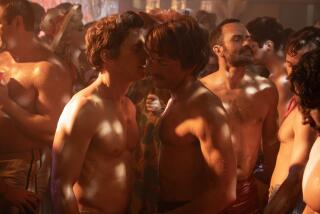A swing back to ‘70s sex
- Share via
With its tantalizing promise of orgies and open marriages, “Swingtown” has gotten so much press that when the pilot episode opens with a pilot character, you almost miss the joke because you’re too busy waiting for all the groovy sex. Yes, there is a “Coffee, tea or me?” moment when it seems like the airline pilot in question, Tom Decker (Grant Show) is being, er, serviced by a flight attendant (back when they were called stewardesses), and yes, he does go on to bring home a winsome young thing to the wife for a little threesome action. But for all the sexual daring and nostalgia the off-screen menage a trois musters -- no exchange of sexual history needed, not a condom in sight -- it’s hard to get past the opening scene.
Man, remember when pilots weren’t locked into their cockpits? When passengers were free to roam the aisles and flirtation was expected if not encouraged? Remember when flying was actually considered sexy?
Heck, remember when sex was considered sexy?
For all the Industry Chatter, the new CBS drama might as well be called “That ‘70s Sex Show.” A network daring to tread in the R-rated territory previously left to the cable stations -- imagine! But while there is off-screen fornication aplenty in the first episode, this isn’t a show about sex so much as it is about sexiness. About a time when sex drove more than just tween marketing, when Americans weren’t pre- or post-anything, when groovy was still groovy and grown-ups gave much more thought to their own social lives than they did to their children’s.
A noble pursuit, and certainly a relief considering the growing clinical nature of sex on television and the disturbingly airy freedom with which the term “the sexless marriage” is now thrown around. If only the pilot were a little less contrived.
To explore the spectrum of white middle-class behavior, creator Mike Kelley (“The O.C.” “Providence”) gives us three couples living in Winnetka, Ill., and its environs. Airline pilot Tom and his wife, Trina (Lana Parrilla), are the swingers in residence -- Trina’s only comment after her husband brings home the young stew for an afternoon dalliance is that they “try to stay in their own age bracket for a while.” Enjoying a post-coitus Tab, she happens to glance out the window to see her new neighbors, who are nothing if not age-appropriate.
The Millers, Susan (Molly Parker of the late, lamented “Deadwood”) and Bruce (yes, that is Jack Davenport who played Norrington in “Pirates of the Caribbean,” which takes a few minutes to get used to), are the quintessential “happy on the outside” couple, making the move from lower middle to upper middle class.
It is quickly and clunkily established that Susan is feeling vaguely dissatisfied; she confides to her soon-to-be old neighbor Janet Thompson (Miriam Shor) that she feels it is time to move on to something else. Janet, who is forced, at least in the pilot, to wear unbecoming hausfrau frocks and channel a young Gladys Kravitz, provides the nagging conservative voice.
The Millers are in their new home mere seconds before the Deckers pounce, showing up in matching running outfits to invite them to a Bicentennial party where, with the Thompsons in tow, they enter a world of quaaludes, joints and “play rooms.”
That a fairly conservative, moderately happy couple would suddenly throw monogamy to the wind is a bit hard to believe, but “Swingtown” is clearly not interested in wondering whether Susan and Bruce will become swingers but rather what happens after they do.
One can only hope that the narrative jury-rigging of the pilot is a one-time thing, because “Swingtown,” like any other fantasy, will work only if the characters are as believable as the circumstances are extraordinary. Seeds for stories involving the various children have been planted, but more interesting will be how Kelley and his writers handle the issue of adultery. The tendency in these family-fascist times is to punish cheating adults, especially when their cheating causes them to in any way ignore the needs of their kids (see “The Ice Storm” or, more recently, “Little Children”).
Meanwhile, the hair is certainly great, and the clothing. Did Americans ever look as collectively terrible as they did during the 1970s? It’s hard to imagine. There was something so super-stylized about the decade. Blame it on the introduction of the curling iron or John Travolta’s white suit in “Saturday Night Fever,” it was a decade of consumer-driven self-consciousness, which is difficult to capture precisely.
While AMC’s “Mad Men” has time and nostalgia to sweeten its glamorous evocation of the early 1960s, the ‘70s are a little too close for comfort. With a score that includes REO Speedwagon and the Captain & Tennille, “Swingtown” walks a fine line between being a period piece, down to the pudding cups, baseball shirts and snatches of the old “$10,000 Pyramid,” and parody.
Whether it winds up genuinely sexy or mostly silly, “Swingtown” serves as a bracing reminder of a time when American adults actually considered sex recreational and, gasp, fun. As titillating or unbelievable as the wife-swapping or orgies may be, the real shock is seeing adult libidos uncrushed by bills and careers, e-mail and soccer practice -- no cellphones, no BlackBerries, and the kids actually ride bikes to their various activities! In the 1970s, multi-tasking didn’t exist.
How sexy is that?
--
mary.mcnamara @latimes.com
--
‘Swingtown’
Where: CBS
When: 10 to 11 tonight
Rating: TV-14-DLS (may be unsuitable for children under the age of 14, with advisories for suggestive dialogue, coarse language and sex)
More to Read
The complete guide to home viewing
Get Screen Gab for everything about the TV shows and streaming movies everyone’s talking about.
You may occasionally receive promotional content from the Los Angeles Times.







